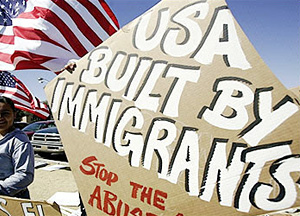 |
 |
 |
 Editorials | September 2006 Editorials | September 2006  
Immigration Tipping Point?
 Ernest W. Lefever - Washington Times Ernest W. Lefever - Washington Times


| | America in the coming decades may be in danger of losing its character and moral stature under the impact of uncontrolled immigration and other forces that challenge our unique place in history. |
There is no room in this country for hyphenated Americanism.
- Teddy Roosevelt, 1915

Feeling the heat of the midterm elections, Senate Majority Leader Bill Frist says it's time to authorize a 700-mile fence to stem "uncontrolled" immigration from Mexico. It now looks like the Senate will follow the House in approving the fence. Homeland Security Committee Chairman, Rep. Peter T. King, New York Republican, said he has "never seen such a disconnect between the American voter and many elite lawmakers," adding that "securing the border this year is a cornerstone to national security."

Yet, in plain fact neither the president nor Congress has shown the courage to enforce existing laws and irate citizens warn that "uncontrolled immigration" threatens U.S. sovereignty and territorial integrity. Left unchecked, some observers believe immigration, especially from Mexico, could eventually lead to the undoing of the American idea and ethos we have long taken for granted. Some even see a future tipping point after which our cherished democratic institutions and even the English language will give way to the babble of tongues and a confusion of morals already afflicting our Western European partners.

In his new book, "State of Emergency," Patrick J. Buchanan contends unchecked immigration is nearing such a tipping point. If the "flood" of Hispanics goes unchecked, he says, "America will no longer be one nation, but more like the Roman Empire - a conglomerate of races and cultures" that bears little resemblance to traditional America. Others are less apocalyptic

The Hispanic influx has already changed the face of America. Today, the United States hosts 12 million illegal aliens with 100,000 new arrivals each month. Most are law-abiding and hard-working, but many engage in criminal activity.

In significant respects, the behavior of these immigrants differs from that of most Americans. In 2002, according to official U.S. statistics, half of all children born here to Hispanics were illegitimate, 42 percent higher than the overall U.S. rate. Hardly surprising because the out-of-wedlock rate for foreign-born Hispanics is 40 percent. Further, 22 percent of all births in California are to illegals, many to Mexican women who entered illegally or overstayed their visas so their children could enjoy tax-supported U.S. medical and school benefits.

Central American immigrants today are less likely to learn English and to become integrated into our society than those from Europe and Asia in the 19th century. who were eager to embrace American ways. In contrast, a minority of Mexicans see immigration as a way to fulfill Mexico's dream to recapture land lost to Mexico in the Mexican War. Others stubbornly reject the English language and insist that Spanish be taught in the public schools and used in voting and citizenship documents. Some have defiantly waved the Mexican flag in street demonstrations in Washington and other American cities.

Others are reluctant to give unqualified allegiance to the United States. In January 2006, Mexican pop singer, Thalia, after sworn in as an American said: "This morning I acquired United States citizenship.... I can also have Mexican citizenship... I am of Mexican nationality and I will always be a proud Mexican in heart and soul."

Ominously, the flood of Mexicans into America is similar to the post-World War II migration of Algerians and other Muslims into France and elsewhere in Europe. This, plus the declining birthrate of native-born French and German citizens has changed those countries' culture. Unless birth and migration rates reverse, within two or three decades Germany will no longer be Germany. Demography is destiny.

Such dramatic change has not yet shaken the United States, but our culture - economic, intellectual and religious - has already been altered under the impact of internal forces, notably the sudden rise of a boisterous student counterculture in the 1960s. Dubbed the "new barbarians" by historian Daniel Boorstin, the radicals rapidly penetrated our leading universities that in turn became hot beds of postmodernism and political correctness.

With these and other countercultural forces, how long will the America we cherish survive with its soul and humane power intact?

The destiny of Ancient Rome may suggest an answer. For several centuries, Rome imposed its language, governance, culture and morality upon much of the known world. Then gradually Rome fell under the pressures of an overstretched empire, assaults by the external barbarians, and the blandishments of barbarians inside the gates. The rule of law, order and a rudimentary Judeo-Christian culture gave way to confusion and expediency.

In many ways, today's America is like modern Rome at its zenith. As the sole superpower, we for the most part have used our might wisely and humanely. But like all previous empires, America in the coming decades may be in danger of losing its character and moral stature under the impact of uncontrolled immigration and other forces that challenge our unique place in history.

If the American idea is to survive, we must preserve our heritage of freedom and democracy, united by the Bill of Rights, the English language and citizens who participate fully in the American dream.

Ernest W. Lefever is founding president of the Ethics and Public Policy Center. His most recent book is "America's imperial Burden: Is the Past Prologue?" | 
 | |
 |



